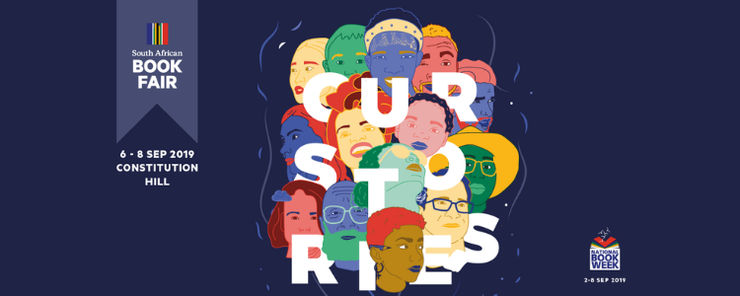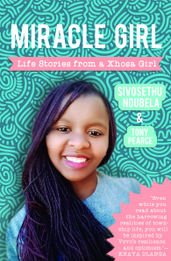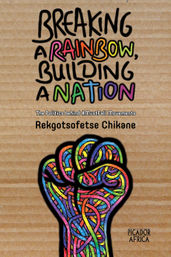Be part of this year's South African Book Fair
“At its core, the South African Book Fair is transformative, inclusive and diverse in nature. Because that is what our country needs.” - Elitha van der Sandt, CEO of the South African Book Development Council

With close to a 100 authors, poets, storytellers and illustrators participating in 53 panel discussions and sessions (including a children's programme) this year's South African Book Fair is unmissable! Taking place at its new home in Constitution Hill, the fair will run for three-days (6 - 8 September 2019).
Jam-packed with loads of family-friendly activities, a buzzing book marketplace, children's magic tent, tours, workshops, cookbook cafe and poetry sessions - the fair has got something for everyone. This year’s programme will also include the celebration of indigenous languages and will feature a variety of events dedicated to this crucial part of the homegrown book industry.
Here are Pan Macmillan authors who will be at South African Book Fair: Mandy Wiener Rekgotsofetse Chikane, Dr Tlaleng Mofokeng, Luke Alfred, Frank Chikane, Gaongalelwe Tiro, Vovo Ndubela, Sue Nyathi, Cassava Republic's Sarah Ladipo Manyika, kid's author Refiloe Moahloli and illustrator, Mogau Kekana.
Book your tickets on Webtickets. Tickets will also be available at the door.
Daily admission tickets cost R 10.00, with children under 16 free.
Vuvuzela Dawn
by Luke Alfred
In 2019, South Africa celebrates 25 years of democracy and the freedom that turned the country from a political pariah to one warmly embraced by the world. Nowhere was the welcome more visible, or more emotional, than in sport. Vuvuzela Dawn tells the stories of that return.
From Bafana Bafana’s Africa Cup of Nations win to the fabled ‘438’Proteas game, we go behind the scenes of the great moments and record-breaking triumphs from 1994 to the present. From Caster Semenya and Wayde van Niekerk to Benni McCarthy and Kevin Anderson, from twin World Cup rugby victories to the traumas of Kamp Staaldraad and Hansie Cronjé, Vuvuzela Dawn reveals the sporting dramas and passions that defined a quarter century.
Dr T
by Tlaleng Mofokeng
The indomitable Dr Tlaleng Mofokeng – affectionately known as Dr T – is passionate about making sexual health and well-being services available to all, regardless of their sexual and gender identities and their economic status.
This book is filled with the specifics of sexual anatomy and health as well as advice and facts about pleasure and sexual rights. Dr T, with her typically honest and warm approach, makes the reader feel comfortable reading about topics that are not always discussed freely, providing ALL the information that demystifies sex and sexuality in a way that is entertaining and enlightening.
Eight Days In September
by Frank Chikane
Eight Days in September is a riveting, behind-the-scenes account of the turbulent eight-day period in September 2008 that led to the removal of Thabo Mbeki as president of South Africa.
As secretary of the cabinet and head (director-general) of the presidency at the time, Frank Chikane was directly responsible for managing the transition from Mbeki to Kgalema Motlanthe, and then on to Jacob Zuma, and was one of only a few who had a front-row seat to the unfolding drama.
Eight Days in September builds substantially on the so-called Chikane Files, a series of controversial articles Chikane published with Independent Newspapers in July 2010, to provide an insider’s perspective on this key period in South Africa’s recent history, and to explore Thabo Mbeki’s legacy.
Miracle Girl
by Sivosethu Ndubela
Sivosethu Ndubela – fondly known as Vovo – is a young Xhosa girl who lives in New Brighton, near Port Elizabeth.
Apart from growing up with the challenges of poverty, crime and limited opportunities, Vovo was orphaned when she was 13. This led to Tony Pearce going from a friend of the family, involved in an after-school dramatic arts project, to become the guardian of Vovo and her older sister, Vuyolwethu.
A few years later Vovo was diagnosed with a rare heart condition. She subsequently underwent two life-threatening open-heart surgeries. Her recovery continues to surprise her family and healthcare specialists, and her bravery in fighting for her life is a true inspiration.
By sharing the harsh circumstances of township life and the factors that have shaped her journey, Vovo reveals her remarkable resilience and it becomes clear why she is a Miracle Girl.
Parcel of Death
by Gaongalelwe Tiro
Parcel of Death recounts the little-told life story of Onkgopotse Abram Tiro, the first South African freedom fighter the apartheid regime pursued beyond the country’s borders to assassinate with a parcel bomb.
On 29 April 1972, Tiro made one of the most consequential revolutionary addresses in South African history. Dubbed the Turfloop Testimony, Tiro’s anti-apartheid speech saw him and many of his fellow student activists expelled, igniting a series of strikes in tertiary institutions across the country. By the time he went into exile in Botswana, Tiro was president of the Southern African Student Movement (SASM), permanent organiser of the South African Student Organisation (SASO) and a leading Black Consciousness proponent, hailed by many as the ‘godfather’ of the June 1976 uprisings.
Parcel of Death uses extensive and exclusive interviews to highlight significant influences and periods in Tiro’s life, including the lessons learned from his rural upbringing in Dinokana, Zeerust, the time he spent working on a manganese mine, his role as a teacher and the impact of his faith in shaping his outlook. It is a compelling portrait of Tiro’s story and its lasting significance in South Africa’s history.
Breaking a Rainbow, Building a Nation
by Rekgotsofetse Chikane
Breaking a Rainbow, Building a Nation is a first-hand account of the university protests that gripped South Africa between 2015 and 2017, widely better known as the #FeesMustFall. Chikane outlines the nature of student politics in the country before, during and after the emergence of #MustFall politics, exploring the political dynamics that informed and drove the student protests, and the effect that these #MustFall movements have had on the nature of youth politics in the country.
Chikane looks at how the current nature of youth politics is different from previous youth upheavals that have defined South Africa, specifically due to the fact that the protests were being led by so-called coconuts, who are part of the black elite.
Breaking a Rainbow, Building a Nation poses the provocative question, can coconuts be trusted with the revolution?
Ministry of Crime
by Mandy Wiener
As a follow up to the bestselling Killing Kebble: An Underworld Exposed (2010), the new book from Mandy Wiener, Ministry of Crime: An Underworld Explored, examines how organised crime, gangsters and powerful political figures have been able to capture the law enforcement authorities and agencies. These various organisations have been eviscerated, hollowed out and left ineffective. They have been infiltrated and compromised and, as a result, prominent underworld figures have been able to flourish in South Africa, setting up elaborate networks of crime with the assistance of many cops. The criminal justice system has been left exposed and it is crucial that the South African public knows about the capture that has occurred on different levels.






